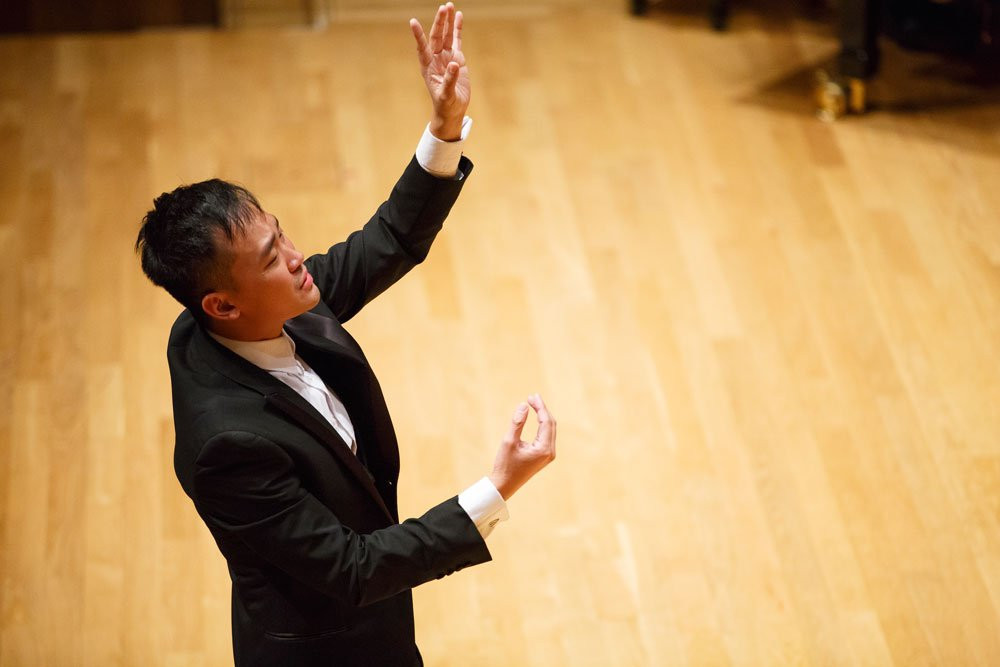Singaporean Conductor-Composer Darius Lim is one of the leading new-generation Asian Conductor-Composers of his time. Currently Music Director of VOCO Singapore Ladies Choir and VOCE Singapore Men’s Choir, Associate Choirmaster of the Singapore Symphony Children's Choir, as well as President of the Choral Directors’ Association of Singapore, Darius Lim has risen to prominence in the national and international music scene with more than 40 national and international awards that include Gold medals, 1st and 2nd Prizes, Category Champions, and other special prizes in both local and international choral and composition competitions.
STYLEGUIDE sits down with Darius to find out more about his pursuit of learning, his reasons and motivations behind ‘Voices of Singapore’ – the biggest local non-competitive choral festival – and how the power of a few words helped him to achieve his goals.
How did you move into the choral scene after starting out with piano?
I started singing in choirs when I was 7. At 17, I made a life changing decision by enrolling into the the Nanyang Academy of Fine Arts (NAFA) where I studied composition and piano. At the same time, I started assisting conductors with choirs ever since I was around 17 years old.
That was my turning point.
Choral conducting is definitely something that I will love to do more. I like having the personal approach, the communication, and being or having the knowledge that I am enhancing somebody’s life by educating them when I’m involved in choir.
Piano is still something I like to do alone, I rarely do solo piano performances anymore, although I would like to still perform if I had the time!
Looking at the list of accomplishments that you’ve already got under your belt, what motivated you to continue studying for a Doctorate?
Well, it was actually a long consideration to do a Doctorate. I’m at that stage in my career where I’ve already experienced a lot of things; I have explored many wonderful things in the music scene and about what I can do, specifically composition, performing, playing with the piano and touring around the region giving concerts.
I realized that learning has to be ongoing. When I came back from the UK after a postgraduate degree at one of the Royal schools, I got caught up with work and felt that things were going so fast in Singapore I didn’t have time to actually breathe and allow myself to learn, to read, and to experience more good music making from others.
The biggest thing I feel is different here compared to other choral scenes in other regions is that many Singaporeans don’t actually sing after they are 18 years old.
Basically it’s because of lifestyle and career, but it’s also because of the system. The education system actually compels us to be in a constant mode for excellence. When you sing in a choir, there is often pressure that you have to win, or get a distinction. There is nothing bad about that, but there is a fine line between drive and passion versus unhealthy stress to win.
The Doctorate research is intended to go deeper into understanding and creating new practices in choral music so as to use this art form as a vehicle for greater cultural understanding and awareness in Singapore; to create a happier nation through music would be something really terrific!
That’s why I started the ‘Voices of Singapore’ festival – and it soon became the largest local non-competitive festival where choirs from all over Singapore where regardless if you are from a church, school, or institution, all of them can just come together and just sing.
Can you tell us more about what will go on during the ‘Voices of Singapore’ festival?
Each concert will have six to ten choirs, and the performances will go on non-stop. Everyone can just go in and out of the festival and watch the performances that we have going on. The past few years have been such a great atmosphere to be in. We had 8,000 people going in and out of CHIJmes Hall within the two days, and it’s like a huge festival of just music.
This is something that we lack in Singapore because in everything we do, we have to always be the best, which technically is not a bad thing, but the arts and music making is not defined by the prizes we get or the academic papers we collect.
Arts, or in this case, singing – our voice is really the only instrument that everyone has, yet it’s also the only instrument that everyone doesn’t really use. This is something that is so special, yet so untouched. It is something that everyone can do. This was the reason why I started the festival, provide a platform for everyone to come together to sing, with no boundaries in race, religion or level of music- to broaden our awareness that singing is for everyone.
What are some memorable moments from the VOICE workshops that you’ve held at the Esplanade where you invited the public to engage in choral music?
You can actually see people who are skeptical about singing at first, who came just because they are pulled along by their friends, and you can see the moment they get that sudden inspiration, or that ‘Eureka’ moment, when they look at you and they go, “Oh my God, this sounded great. I can’t believe I can sound like that.”
I think that moment of self-realization that you can achieve something totally beyond what you think you can do is so amazing. It makes you leave the room with the confidence that you can sing – and it doesn’t just connect with you or music, it connects with everything you do in your personal life and at work.
Singing is so different from any other instrument. It’s the only instrument that is in your body, the only instrument that you can feel so strongly, which you can actually use and yet be so versatile.
It’s something that is very personal to each and every one of us. So I mean, to bring out a voice in everybody, and to see somebody understand how to express their emotions and thoughts through song – it’s the most rewarding thing.
To have a person come up to you and say, “That was really like out of this world – I didn’t even know I could do that!”
I also don’t believe in this thing called ‘tone-deaf’. There’s no such thing as being ‘tone-deaf’ – it’s just due to what some might call ‘lazy hearing’ or the inability to hear certain frequencies because your ears are not tuned to it.
In short, anybody and everybody can sing.
What kind of impression do you think the general public has when it comes to choral music?
I think Singapore is such a special place to be when it comes to this area. There’s a lot of cosmopolitan diversity here but it’s relatively untapped and people don’t really know about choirs. The choral world at this point of time consists of the majority of school choirs, choristers who sing in community choral ensembles, church choirs, a capella groups. The audience base is still relatively small.
When people hear about choirs, all they can think of is the usual scenes that you see from the movies. But now what we are moving towards is so much more than one kind of style and that kind of approach.

Do you think that competitions in choral should still be present, given that it fosters such a competitive environment among those who partake in it?
At the end of the day, competition is good if we see it as healthy competition, without giving singers an impression that failure is not acceptable.
What are your thoughts about nature versus nurture when it comes to talent?
I’ll quote you what my professor said, “Real musical skill is 99 percent hard work and 1 percent talent.” If you don’t work hard with whatever you have at hand, talent will only get you so far.
Of course, you have to have a certain inclination or passion and drive towards music. You may have a certain ‘ear’ or ‘feel’ for music, but I think hard work is key ultimately.
I’ve seen people who are totally unmusical, but they practice eight hours a day and they eventually became one of the best players in Singapore.
It’s rather subjective but if you work hard, be really determined and have the perseverance especially if the arts is the field that you really want to be good at, you can get what you want.
What more do you think can be done for the music scene in Singapore?
I think every child should start singing young – the singing voice – really brings out many things in the child and allows space for creativity, expression and helps diction.
Singing brings out focus, it brings out inclination and it brings out awareness of your voice, of music, and of sound. It should be expressed to all teachers in Singapore to start teaching kids how to sing regardless if they are good or not – just let them sing.
The education system in Singapore is holistic in the sense that it gives students a good balance of academic work and co circular actives, and I am sure will become better in the years to come.
What is your main inspiration when it comes to writing music?
My inspiration always comes during a period when I’m experiencing heightened emotions – like when I’m very sad, or very happy.
Nowadays I get inspiration from the places I visit, or real life stories I read about.
I recently went to South Africa and it was really amazing. I started to write a lot of music there, and it’s even more special because every place I visited had a different ‘feel’.
A music piece, ‘Echoes of The Lost Peak’, was also inspired from the trips I made exploring caves. When I look at scenes in nature like that, I just feel so inspired to write more. It was so, so magical. That’s another way on how I get inspiration for my music.
And sure, all these travels are usually for work and unplanned, but I always try to extend a few more days to go see something crazy.
Which is why I believe you should live like you’re going to die tomorrow, but learn like you are going to live forever.

After starting your journey in music, were there any points that made you feel like quitting?
I think it’s very important that at the end of the day, no matter what we do, we know what we want, and that we always have an end result in mind.
I always told myself that no matter what I do, despite where I go or where I end up – my goal is to use music to inspire others, be it through singing, through my compositions, or through music events.
That’s my end goal in mind and it worked.
Whether it’s in piano or composition or choral music, the eventual goal of where you want to go all boils down to a few words, like the most important five or six words to you in your head – it could be dreams, inspire, excellence, humility, awareness, love, friends and family.
It took me many years to find these words, but eventually we all will.
For most of us when we are in our twenties, we have no idea about what we want to do sometimes. We always fear and we want to try this or try that and sometimes we don’t know where things are leading us.
But so long as you have your end goal in mind, and always have that inner drive and mission within - I think that's the most important thing.
Our dreams and career will always change, it’s ever evolving and it’s only natural.
But to achieve real success, you have to know what’s your final destination and what core values you believe in – that is the most important because that is what defines us at the end of the day.
What advice would you give to your younger self?
I would give myself a lot of advice but if it’s just one – I think I would have to say it’s to enjoy the process.
Many times in the past, I was just so caught up thinking about the final result that I didn’t really enjoy some of the processes of working towards what I wanted.
I was more stressed out from trying to get to it.
So I think enjoying the process is very important to me right now, to enjoy the journey of the practice, the rehearsals – the simplest things in music without being fixated on the big stage.
Enjoy interacting with people and really interact with them with your heart instead of interacting with them with a goal in mind.
I think this is something that every young person has to know. Everyone has big dreams, and everyone does something because of a certain purpose, but a lot of us forget to enjoy the journey of getting there.
Most only think about reaching their dreams, and when we do get there, we will always want more and more and more. People will see success in us, but we don’t see the success in ourselves – we just keep thinking about how we can do more of something. Sometimes we have to just stop and smell the flowers.
At the end of the day you only live once, so why not just go all out and enjoy the journey.
What are the hopes and aspirations that you have for the future?
I think my eventual goal is to see at least 1 in 3 Singaporeans singing, to see even more people actively singing and participating together. I really hope that in the future we have lunchtime crowds in the CBD (Central Business District) coming together to sing!
Second will be for Singaporean choral works to be sung internationally, and for Singapore to be more recognized on the greater world map in terms of choral music. We have such a unique and diverse culture, so let’s share it to the rest of the world.

















